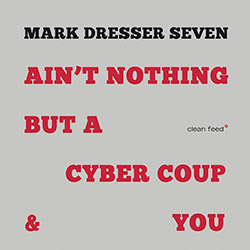
Bassist extraordinaire Mark Dresser probably needs no introduction by now, which is for the better, as it allows the reviewer more space to talk about the music and less on having to contextualize it. That said, it must be noted here that this is the second album of Dresser's septet for the Portuguese Clean Feed label, its debut Sedimental You issued in 2016. Not having heard that one, this reviewer is grateful that the leader has provided insightful notes that enable listeners to contextualize things.
Like its predecessor, Dresser has an exceptional lineup at his disposal, the frontline comprised of Marty Ehrlich, Nicole Mitchell, Michael Dessen and Keir GoGwilt (a violinist and only personnel change from the previous outing), with pianist Joshua White and the always savvy Jim Black on drums sharing rhythm section duties with the leader. However, this distinction should not be misconstrued as the album's division of labour as would be the case in a more conventional jazz album. The music is much more complex structurally, like that of multiple overlapping parts found in contemporary chamber music. But there are very jazzy moments, too, like the opening of the first track "Black Arthur's Bounce" (dedicated to the late Arthur Blythe, an early employer of the bassist in his L.A. days), Ehrlich leading the way here with his full-bodied and easily identifiable alto sound.
There also is a dedicatory thread running through the 11 tracks of this 64-minute side, with the punning "Embodied in Soul" or the very name of the title track that Dresser claims to be winkingly reminiscent of classic titles from the Great American Song Book like "I'm Just a Lucky So and So" and "Things Ain't What They Used to Be". The final cut, "Butch's Balm", is also a tribute to another recently departed musician, pianist Butch Lacy, another early musical acquaintance of Dresser. The piece, a ballad of haunting simplicity, is the result of the bassist's attempt to reconstitute by memory a melody played to him by the pianist during their last encounter in Copenhagen.
The sequencing of the tracks show also be noted, where short yet very probing bass solos (of a minute or less) are inserted between the six full ensemble pieces ranging from seven to twelve minutes. Those who have heard the first release may well be at an advantage in appreciating this record, but the aural evidence here is good enough to know that it stands very well on its own as a recording of substance, and one requiring more than a single listen to get the most out of.
Comments and Feedback:



More Recent Reviews, Articles, and Interviews @ The Squid's Ear...


|

